[Llandudno Queen of North Wales Resorts]
[Crich Tramway Museum] [Developing Wales] [Great Orme Tramway] [Industrial Snowdonia] [Llandudno-Manchester Trains] [North Staffordshire Trains] [Stoke-on-Trent Station] [Welsh Highland Railway] [Trips from Llandudno by public transport]
Virgin Trains
Restore the
London to Llandudno
Daily Service
September 27th 2004 until December 12th 2008
Virgin Trains five coach Super Voyager
Class diesel-electric 125 mph inter-city express train having operated
the inaugural
11:21 London (Euston) to Llandudno service on Monday September 27th
2004, arriving on time at 14:37, waits at Platform 2 for its 15:23
return trip due in London at 18:48. The great significance of this new
service is enhanced by the fact that the last daily through service
from Llandudno to
London and back ran towards the end of steam days in late September
1964 and
is now, for the first time in exactly 40 years, being restored by
Virgin
Trains as part of its improved London to North Wales Super Voyager
Pendolino
Service.
Half an hour earlier, before all this, local Llandudno school children, who had arrived early to celebrate the event, were entertained in traditional sea-side style by Professor Codman's Punch and Judy (an entertainment that they can all recite by heart!). 'Professor' Codman came to Llandudno in 1860 just after the first trains. His family continue the Punch & Judy tradition to this day with performances on the promenade on sunny afternoons throughout the summer:



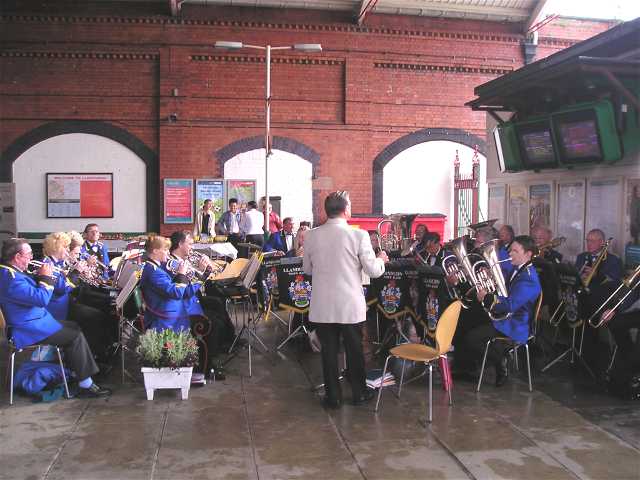
In the background, catering staff organized an excellent finger buffet for all present:
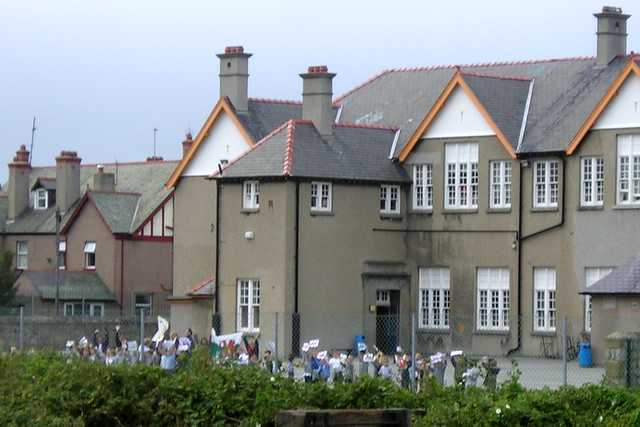
Across the tracks in the local school yard more children cheered and waved Welsh National flags.
So it was that at exactly 14:37 the train arrived in view
through a display of pyrotechnics it slowly came to rest along side platform 2.
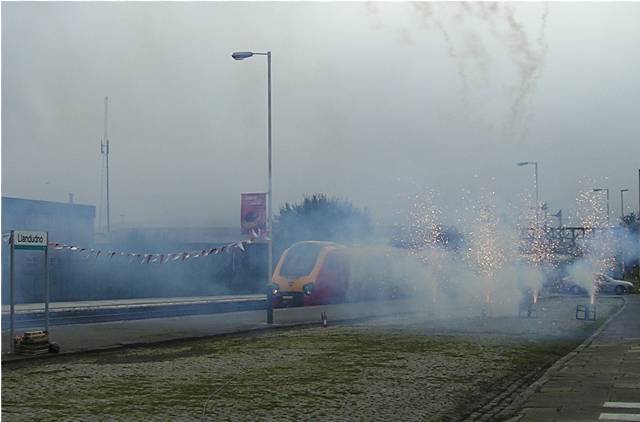
Re-creating with fireworks for Virgin Super Voyager, on this one occasion, the days of steam!
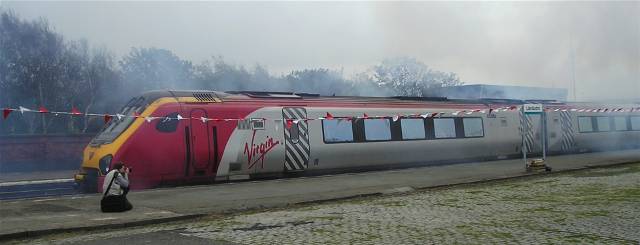
Below, the first through weekday passengers from London in half a lifetime alight at Llandudno.
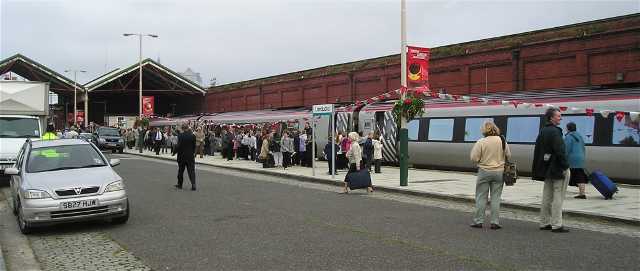
And then came the speeches, several speeches of most excellent quality introduced by the Town Crier:
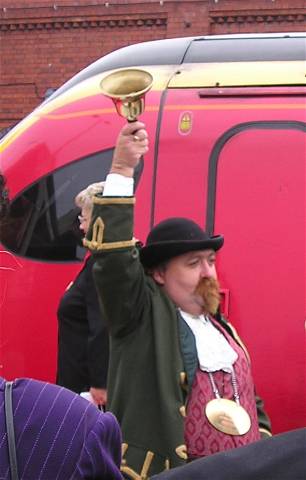
Oh yeah! Oh yeah! Oh yeah! Three cheers for Virgin Trains! Hip! Hip! Hurrah.
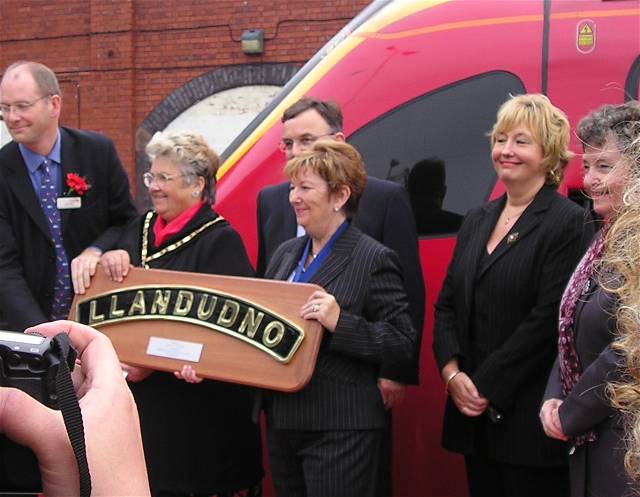
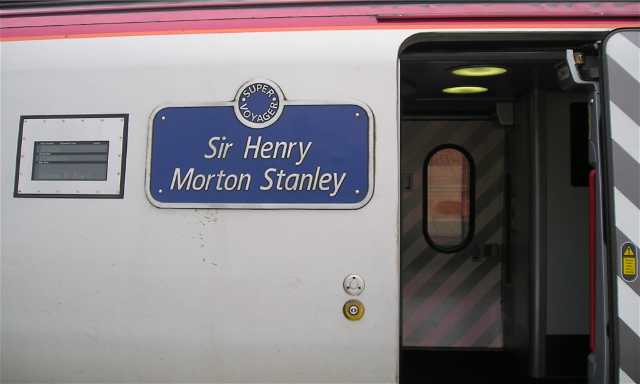
Compilation and photographs © September 27th 2004 by Noel Walley
Email: Webmaster
Updated December 2008
Half an hour earlier, before all this, local Llandudno school children, who had arrived early to celebrate the event, were entertained in traditional sea-side style by Professor Codman's Punch and Judy (an entertainment that they can all recite by heart!). 'Professor' Codman came to Llandudno in 1860 just after the first trains. His family continue the Punch & Judy tradition to this day with performances on the promenade on sunny afternoons throughout the summer:
Across the concourse distinguished
guests, local journalists and surprised travellers perambulated.
Present
was Councillor Mrs Linda Groom, Chairman of Conwy
County Borough Council.
Also present was the Llandudno Town Crier, splendidly attired as befits his station.
To him was to fall the sonorous duty of welcoming the train.
And the station clock is going again!
Also present was the Llandudno Town Crier, splendidly attired as befits his station.
To him was to fall the sonorous duty of welcoming the train.
And the station clock is going again!
While they waited, the visitors
were being entertained, as
is traditional on these occasions, by The
Llandudno Town Band (seated below the train arrival and departure
boards) who played such ditties as 'The Cornish Floral
Dance' 'Men of Harlech' 'God bless the Prince of Wales' and for the
benefit of Richard
Branson, the Virgin
supremo, they played 'Those
Magnificent Men in their Flying Machines'.
In the background, catering staff organized an excellent finger buffet for all present:

Across the tracks in the local school yard more children cheered and waved Welsh National flags.
So it was that at exactly 14:37 the train arrived in view
through a display of pyrotechnics it slowly came to rest along side platform 2.
Re-creating with fireworks for Virgin Super Voyager, on this one occasion, the days of steam!
Below, the first through weekday passengers from London in half a lifetime alight at Llandudno.
And then came the speeches, several speeches of most excellent quality introduced by the Town Crier:
Oh yeah! Oh yeah! Oh yeah! Three cheers for Virgin Trains! Hip! Hip! Hurrah.
And
next a presentation. In 1937, at Llandudno Station, Lady Mostyn
had unveiled the
nameplate 'Llandudno'
on LMS Patriot
Class Express Passenger Locomotive No. 5520. A mounted replica of that
1937
nameplate was presented by Virgin Trains Executive Director Chris Gibb
and accepted on behalf of the
town by Cllr Mrs I.L. Groom (Chairman of Conwy
County Borough Council) and Cllr Mrs A.E. Parry (Deputy Mayor of
Llandudno). Mr Andrew Davies AM minister for economic development and
transport spoke of the very considerable investments now being made in
railway services in Wales. Mrs Betty Williams MP for Conwy and
Mr Denis Idris Jones AM for Conwy both spoke in praise of the new
service.
Today's
super voyager class diesel electric tilting train bears the name 'Sir
Henry Morton Stanley'
after the journalist commissioned by the New York Herald to find Dr
Livingstone in Africa. Stanley was born in 1841 at Denbigh in
North Wales,
the illegitimate son of John Rowlands and Elisabeth Parry. He lived in
the Saint Asaph Workhouse from the age of six until he was 15. He ran
away to sea aged 17 and was befriended in New Orleans
by Henry
Stanley, a merchant whose name he took. Stanley was probably the
greatest explorer in modern times to have been born in Wales. He died
just 100 years ago in 1904.
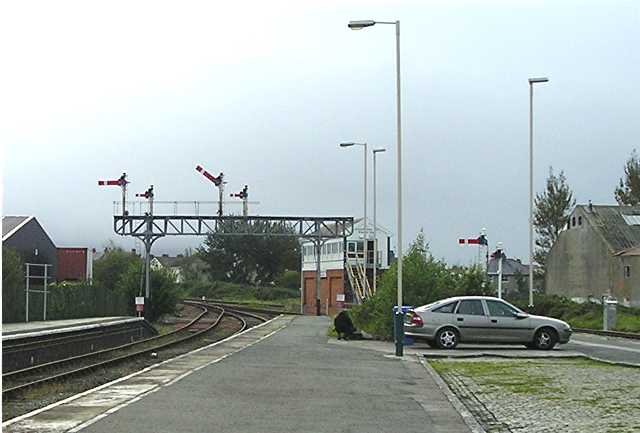
Signalled for departure at 15:23 from platform 2
The new service also calls at Fflint - the first regular through service from there to London for many years.
It is interesting to recall that in the summer of 1939, in the great days of steam, 'The Welshman' express left London Euston at 11-15 am and ran non-stop 205 miles to Prestatyn reached at 3-04 pm and finally arrived at Llandudno at 4-02 pm. Its return journey was not until 11-35 am next morning and after an extra stop at Chester arrived in London at 4-20 pm. In 1939 4¾ hours each way by LMS steam with 5 intermediate stops compared with today's remarkable 3¼ hours by Virgin Super Voyager with 7 intermediate stops.
Meanwhile Arriva Trains Wales hourly service between Llandudno and Manchester Piccadilly (A very important service - 11 air-conditioned trains each way every weekday and each taking about 2 hours 10 minutes with 10 intermediate stops) arrived and departed without undue ceremony from platform 3, its regular platform:
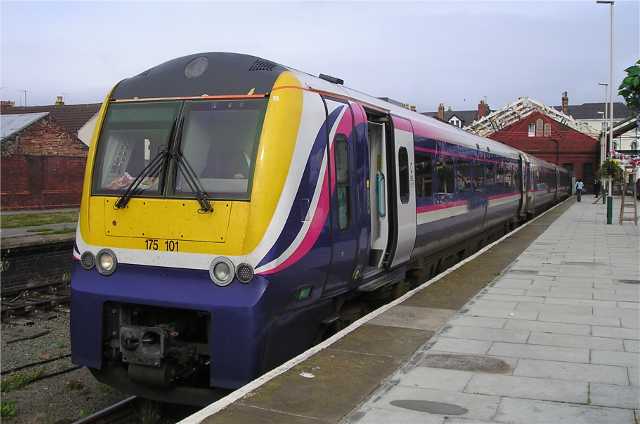
Please
Visit - Llandudno Queen of the North
Wales
ResortsSignalled for departure at 15:23 from platform 2
The new service also calls at Fflint - the first regular through service from there to London for many years.
It is interesting to recall that in the summer of 1939, in the great days of steam, 'The Welshman' express left London Euston at 11-15 am and ran non-stop 205 miles to Prestatyn reached at 3-04 pm and finally arrived at Llandudno at 4-02 pm. Its return journey was not until 11-35 am next morning and after an extra stop at Chester arrived in London at 4-20 pm. In 1939 4¾ hours each way by LMS steam with 5 intermediate stops compared with today's remarkable 3¼ hours by Virgin Super Voyager with 7 intermediate stops.
Major Changes - December 2008
Following the completion of improvements tp the main line between London and Crewe, the 2008/9 winter timetable contains a much improved service from London to Chester (from late January 2009, this will be hourly with a through journey time of 2 hours and 2 minutes from London to Chester) and with five trains daily continuing to Llandudno Junction and Holyhead. Regrettably the through service from London to Llandudno has lasted only four years and ran for the last time on Friday, December 12th 2008.
Following the completion of improvements tp the main line between London and Crewe, the 2008/9 winter timetable contains a much improved service from London to Chester (from late January 2009, this will be hourly with a through journey time of 2 hours and 2 minutes from London to Chester) and with five trains daily continuing to Llandudno Junction and Holyhead. Regrettably the through service from London to Llandudno has lasted only four years and ran for the last time on Friday, December 12th 2008.
Meanwhile Arriva Trains Wales hourly service between Llandudno and Manchester Piccadilly (A very important service - 11 air-conditioned trains each way every weekday and each taking about 2 hours 10 minutes with 10 intermediate stops) arrived and departed without undue ceremony from platform 3, its regular platform:
Also in 1939, the fastest weekday train
from Manchester to Llandudno (the famous 'Club Train') left
Exchange station at 4-30 pm returning from Llandudno next morning at
7-48 am. It took 2 hours 9 minutes in each direction with 6 stops - but
the other three through trains each day were much slower.
The Llandudno train service, despite public opinion, is now twice as
good as it ever was. For information about the Historic Club Train as
well as the excellent Llandudno to Manchester services today, please
click my Llandudno -
Manchester trains page.
Compilation and photographs © September 27th 2004 by Noel Walley
Email: Webmaster
..... Llandudno Attractions
Updated December 2008